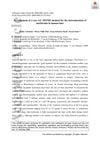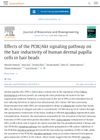Search
for
Sort by
Research
840-870 / 1000+ resultsresearch Transdifferentiation of Human Hair Follicle Mesenchymal Stem Cells into Red Blood Cells by OCT4
Human hair follicle stem cells can be turned into red blood cells.
research Erlotinib-Induced Skin Inflammation Is IL-1 Mediated in KC-Tie2 Mice and Human Skin Organ Culture
Erlotinib causes skin inflammation through IL-1, which can be reduced by anakinra.

research A Model System to Analyze the Ability of Human Keratinocytes to Form Hair Follicles
Scientists developed a system to study human hair growth using skin cells, which could help understand hair development and improve skin substitutes for medical use.

research A Rapid, Simple, Specific Liquid Chromatographic–Electrospray Mass Spectrometry Method for the Determination of Finasteride in Human Plasma and Its Application to Pharmacokinetic Study
Method measures finasteride in plasma, suitable for pharmacokinetic studies.

research Effects of the Anti-Androgen Finasteride on 5-Alpha-Reductase Activity in Human Gingival Fibroblasts in Response to Minocycline
Finasteride helps treat hair loss by blocking enzyme activity.

research Electrophoretic Variability in Human Head Hair: Polyacrylamide Gel Electrophoresis of Hair Proteins in the Presence of Sodium Dodecyl Sulfate and Urea
Human head hair proteins can be typed into eight distinct patterns, useful for genetic and forensic investigations.
research Mesenchymal Stem Cells Antagonize IFN-Induced Proinflammatory Changes and Growth Inhibition Effects via Wnt/β-Catenin and JAK/STAT Pathway in Human Outer Root Sheath Cells and Hair Follicles
Mesenchymal stem cells may help treat hair loss by improving hair cell growth and reducing inflammation.

research Human Epithelial Stem Cell Survival Within Their Niche Requires Tonic Cannabinoid Receptor 1 Signaling—Lessons From the Hair Follicle
Cannabinoid receptor-1 signaling is essential for the survival and growth of human hair follicle stem cells.

research Development of a New GC-MS/MS Method for the Determination of Metformin in Human Hair
A new method was created to measure metformin in hair, showing potential for monitoring treatment and medical investigations.

research Lanostane-Type Triterpenes from the Sclerotium of Inonotus Obliquus (Chaga Mushrooms) as Proproliferative Agents on Human Follicle Dermal Papilla Cells
Chaga mushrooms contain compounds that may promote hair growth better than common treatments.

research Restoration of Hair-Inductive Activity of Cultured Human Follicular Keratinocytes by Co-Culturing with Dermal Papilla Cells
Growing hair cells with dermal cells can potentially treat hair loss.
research Emerging Diagnostic and Therapeutic Potentials of Human Hair Proteomics
Hair protein analysis could improve medical testing and understanding of hair characteristics.

research Potential Synergistic Effects of Human Placental Extract and Minoxidil on Hair Growth-Promoting Activity in C57BL/6J Mice
Human placental extract and minoxidil together significantly promote hair growth.

research Transcriptional Activation of CCN1 and CCN2, Targets of Canonical Wnt Signal, by Ascorbic Acid 2-Phosphate in Human Dermal Papilla Cells
Vitamin C derivative may promote hair growth by activating specific genes.
research Human Essential Fatty Acid Deficiency: Treatment by Topical Application of Linoleic Acid
Applying linoleic acid to the skin fixed essential fatty acid deficiency symptoms.

research Single-Cell Transcriptomics Reveals Lineage Trajectory of Human Scalp Hair Follicle and Informs Mechanisms of Hair Graying
The study found new details about human hair growth and suggests that preventing a specific biological pathway could potentially treat hair graying.
research Human Placental Mesenchymal Stromal Cell-Derived Exosome-Enriched Extracellular Vesicles for Chronic Cutaneous Graft-Versus-Host Disease: A Case Report
Exosome-enriched vesicles from placental cells improved skin condition in a patient with chronic graft-versus-host disease.

research Dexpanthenol Promotes Cell Growth by Preventing Cell Senescence and Apoptosis in Cultured Human Hair Follicle Cells
Dexpanthenol helps human hair follicle cells grow by preventing aging and death, and by supporting growth signals.

research Induction of Hair Keratins Expression by an Annurca Apple-Based Nutraceutical Formulation in Human Follicular Cells
An apple-based supplement was found to stimulate hair protein production, which may help with hair growth.

research Titrated Extract of Centella Asiatica Increases Hair Inductive Property Through Inhibition of STAT Signaling Pathway in Three-Dimensional Spheroid Cultured Human Dermal Papilla Cells
Centella asiatica extract may help promote hair growth by blocking a specific cell signaling pathway.
research Human Epidermal Neural Crest Stem Cells as Candidates for Cell-Based Therapies, Disease Modeling, and Drug Discovery
Human epidermal neural crest stem cells could be used for therapies, drug discovery, and disease modeling.
research The Structural Implications of Water Hardness Metal Uptake by Human Hair
Human hair absorbs calcium and magnesium from tap water, affecting its structure and styling properties.

research L-Ascorbic Acid 2-Phosphate Represses Dihydrotestosterone-Induced Dickkopf-1 Expression in Human Balding Dermal Papilla Cells
Vitamin C derivative reduces hair loss-related protein in cells.

research Regeneration of a New Hair Follicle from the Upper Half of a Human Hair Follicle in a Nude Mouse
The upper half of a human hair follicle can grow a new hair in a mouse, but success is rare.
research Final Report on the Safety Assessment of Human and Animal Placental and Umbilical Extracts in Cosmetics
The safety of placental and umbilical extracts in cosmetics is uncertain, requiring more research.
research On the Use of Micro-Imager to Directly Visualize Drug Distribution in Human Skin
Micro-Imager® helps see how drugs spread in human skin.
research Morphological Analysis of In Vitro Human Hair Growth
Human hair follicles can grow and stay healthy for up to 8 days in a lab setting.

research Neogenesis of Human Hair Follicles
Human hair follicles can grow back.

research Effects of the PI3K/Akt Signaling Pathway on the Hair Inductivity of Human Dermal Papilla Cells in Hair Beads
Activating the PI3K/Akt pathway improves hair growth by human dermal papilla cells in hair beads.